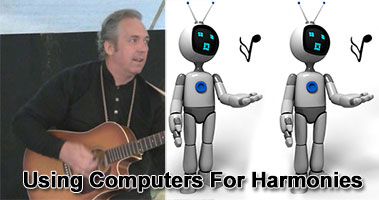 To record vocal harmony, the most basic thing to do is have a human sing each part and put those parts on their own tracks in audio recording software. If you can do it that way, it is arguably the best and most preferable method of doing it.
To record vocal harmony, the most basic thing to do is have a human sing each part and put those parts on their own tracks in audio recording software. If you can do it that way, it is arguably the best and most preferable method of doing it.
But you can also create harmony recordings using software.
Why would you want to use software to create vocal harmonies?
There could be several reasons, like:
- You would rather not deal with singing harmonies, or it’s not in your skill-set
- You don’t have anyone else around to sing your harmonies
- You want the sound of artificial voices – that sound a bit like singing robots – as an effect
What software can you use for this?
There are several programs available that are specifically designed to create vocal harmonies. Two of the most popular are Antares Harmony Engine (brought to you from the makers of Auto-Tune), and Vielklang Instant Harmony. There are others, of course. These programs work really well. But they can be a bit pricy. Harmony Engine is $199 and Instant Harmony is $149.
If you don’t have a couple hundred bucks in your budget for this, there are a couple of other options. Reaper, one of the best and most affordable recording programs around, comes with a couple of different plugin effects that you can use to create harmony. One of these is called ReaVoice. I did a video on how to use it here. The other one is called ReaTune.
Using ReaTune to create harmonies
The primary use of the ReaTune effect is to correct pitch, very much like Auto-Tune and similar programs. But you can use the pitch-altering ability to create harmony notes from a single track of actual vocals. You can see how it works in the video below. But in a nutshell…
- You sing (or have someone sing) the melody of a song on a track (say Track 1) in Reaper
- Copy the vocal to track 2
- Load the ReaTune effect on track 2
- In the ReaTune window, draw in the harmony notes to shift the original audio to those notes
- Repeat the process for each track of harmony. For instance in the video below, the song has 3-part harmony. The sung vocal track is on track one with ReaTune generating one harmony on track two and the 3rd part on track 3
This is a lot more clear in the video here:
[genesis_club_wistia_video id=”0ecf4l543e” pt=”75″]
This video is an excerpt from our course Harmony Recording Awesomeness. Find out more about that by CLICKING HERE.

There’s an even more convenient way to do harmonies via plugins, if the “computerish voice” is not such an issue. Check out “La Voz Cantante”, a free vocoder extremely specialized on doing voice harmonies. In fact, Martin Vicanek somewhere stated that instantly creating harmonies for live gigs was the reason for him to develop it. I love it. See the sound demos at the bottom of the page, too.
https://www.vicanek.de/audioprocessing/lavozcantante.htm
Thanks for the tip!